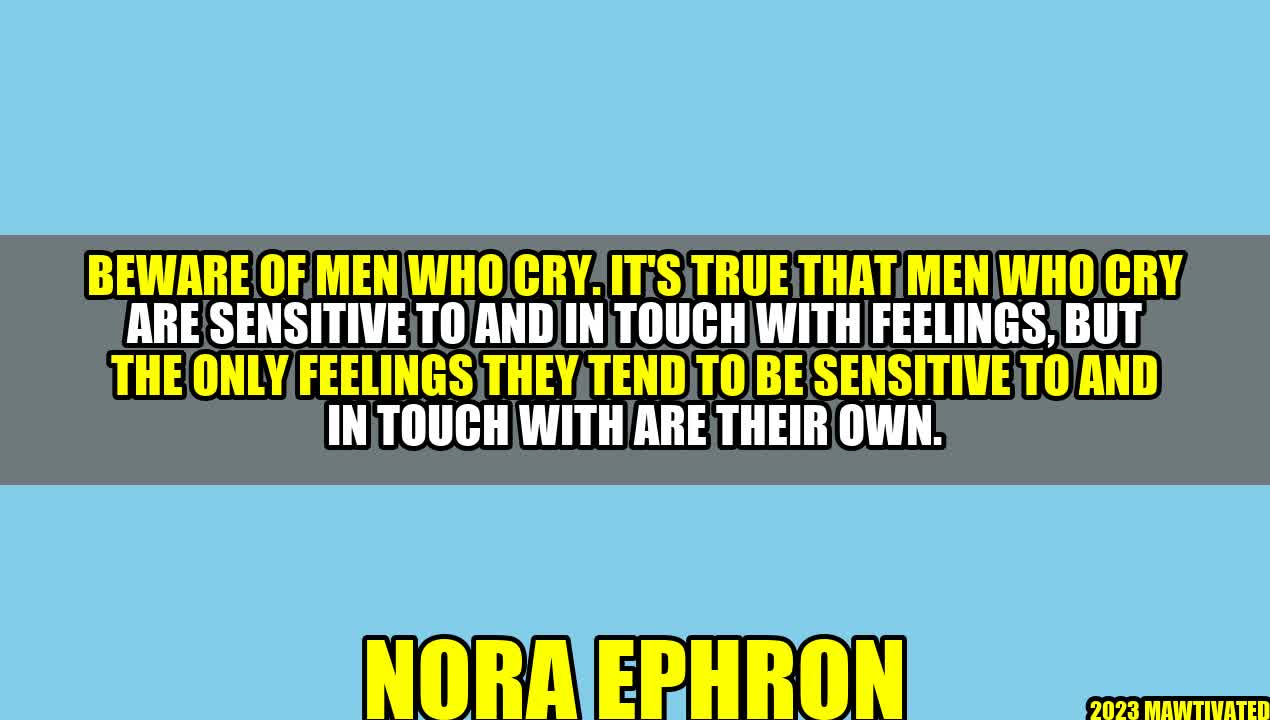The Power of Emotional Intelligence: Why Beware of Men Who Cry?

There is a story I once heard about a manager who was tasked with leading a team through an incredibly difficult project. His team was tired, morale was low, and the deadline was fast approaching. During a particularly grueling meeting, one of the members of his team broke down in tears. The manager was unsure of how to respond – he had been taught to treat crying as a sign of weakness and had dismissed the emotions of his team in the past. But something about this moment felt different – the rest of the team was silent, watching to see how he would respond. So, he did something unexpected – he acknowledged the emotions in the room, and thanked the team member for bringing them to the surface. He listened to what was bothering the team member, and validated their concerns. It was a moment of vulnerability and authenticity that transformed the way the team worked together. They rallied around each other, and not only did they meet the deadline, but they did it while building strong relationships that lasted beyond the project.
There are many myths about emotional intelligence – what it means, how we practice it, and who is capable of it. One of the most pervasive is the idea that crying is a sign of weakness. This notion is backed up by societal norms that teach us from a young age to suppress and repress our emotions – especially men. In her famous quote, Nora Ephron perfectly encapsulates this idea. “Beware of men who cry,” she says. “It’s true that men who cry are sensitive to and in touch with feelings, but the only feelings they tend to be sensitive to and in touch with are their own.”
The Truth About Emotional Intelligence
So, is Ephron right? Should we beware of men who cry, or is there more to it than that?
- Emotional intelligence isn’t just about feelings. When we think of emotions, we often think of sadness, anger, fear, and love. But emotional intelligence encompasses a much wider range of skills, including empathy, self-awareness, and regulation. People with high emotional intelligence are able to manage their own emotions and influence the emotions of others in a positive way. This means that they’re better able to navigate difficult situations and build relationships, both of which are key to success in any field.
- Crying isn’t a sign of weakness. Crying is a natural response to a wide range of emotions, from sadness to joy to extreme stress. In fact, research has shown that crying can be a healthy outlet for emotions – it releases stress hormones and helps us regulate our emotions. However, social norms have taught us to view crying as a sign of weakness, especially for men. This stigma has severe implications for mental health and the way we express ourselves as individuals.
- The stereotypes around crying reinforce toxic masculinity. By equating crying with weakness, we contribute to a culture of toxic masculinity that harms men and women alike. Men who are taught to repress their emotions are less likely to seek help for mental health issues, less likely to form close relationships, and more likely to engage in risky behavior. This isn’t just about individual health – it has implications for the way we behave as a society. When we discourage men from being vulnerable, we’re also discouraging them from being empathetic and attuned to the needs of others.
The Benefits of Emotional Intelligence
So, what does emotional intelligence look like in practice? How can we cultivate it in ourselves and others?
- Better relationships. When we’re emotionally intelligent, we’re better able to form and maintain close relationships. This means we’re more likely to have supportive networks of friends and family, which has been linked to improved health outcomes. Emotional intelligence is also key to building strong teams in the workplace and creating a positive work environment.
- Greater resilience. When we’re able to regulate our own emotions, we’re better able to bounce back from setbacks and overcome challenges. Emotional intelligence allows us to view problems as opportunities for growth, and to maintain a positive outlook even when things are tough.
- Better decision-making. When we’re in touch with our own emotions and attuned to the emotions of others, we’re able to make better decisions. Emotional intelligence helps us weigh pros and cons, anticipate consequences, and consider the impact of our choices on those around us.
How to Cultivate Emotional Intelligence
Emotional intelligence isn’t something you’re born with – it’s a skill that can be developed and strengthened over time. Here are some tips for cultivating emotional intelligence in yourself and others:
- Practice self-awareness. Take time to reflect on your emotions and how they’re impacting your behavior. This can involve journaling, meditation, or simply taking a few deep breaths before responding to a difficult situation.
- Cultivate empathy. Make an effort to understand the perspectives and emotions of those around you. This means active listening, paying attention to body language, and responding with empathy and understanding.
- Model vulnerability. Lead by example by being honest and authentic about your own emotions. This can mean admitting when you’re struggling, offering support to others, and creating a safe space for others to do the same.

Curated by Team Akash.Mittal.Blog
Share on Twitter
Share on LinkedIn